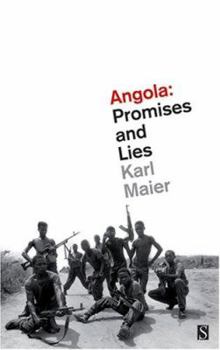Angola: Promises and Lies
Angola's civil war has been the longest and bloodiest in Africa. What was once a proxy conflict between the Cold War superpowers has become an apparently endless ethnic conflict. While the political... This description may be from another edition of this product.
Format:Paperback
Language:English
ISBN:1897959524
ISBN13:9781897959527
Release Date:October 2007
Publisher:Serif Publishing
Length:224 Pages
Weight:0.80 lbs.
Dimensions:0.5" x 5.3" x 8.5"
Customer Reviews
3 ratings
A good education on the Angolan civil war of the 90's
Published by Thriftbooks.com User , 21 years ago
Mr. Maier provides a basic education on the Angolan civil war of the 90's and the circumstances under which it came it be. He has done an admirable job of coupling historical fact and his own experiences into a easily readable memoir of less than 300 pages. However, it would be unfair to the author to compare his writing to that of Rysczard Kapuczinski who's writings about Africa are presented in a style which is closer to poetry than non-fiction.I may have just got a bad copy, but it was all I could do to keep the book from disentigrating before I could finish reading it. Every time I opened it 2 or 3 pages would pop out of the binding......... Finally, I would like to put a caution out to the potential reader. Please be aware that I do not have the book in front of me at this time and the following quote may not be exact but I promise it is real close. In the closing pages of the book Mr. Maier writes (for reasons that I cannot remember) " the US's failed attempts to impose their new world order on Mogadishu"..........and that was it....no mention of starving people...the UN...or warlords using food as tools of power. Clearly, Mr. Maier is entitled to his views and I would never condemn this well written book for a single misguided statement, but the reader is left wondering if the author may have left other vital pieces of info out of this book in order to further his political agenda.
An interesting account of a poorly covered war
Published by Thriftbooks.com User , 23 years ago
While this is a better book than "This House Has Fallen" the author's most recent book about Nigeria, it suffers from the same problem of being a series of frequently random encounters with the country in question and the events in it over a period of several years. There is some attempt to give the readers a more structured understanding of the historical and political background, but at the end of the day it is a series of points on a timeline as experienced by the author. His experiences are very interesting, and he is a thoughtful and observant writer who feels an admirable degree of passion for those suffering from the ongoing conflict.
A rivetting account of the Angolan civil war
Published by Thriftbooks.com User , 26 years ago
Reviewed by MARGARET ANSTEE in International Relations, Volume XIII, No 2, August 1996 - Karl Maier describes the long-running Angolan conflict as `the worst war in the world'. During my tenure there in 1992-3 as Special Representative of the Secretary-General and Head of the UN Angolan Verification Mission (UNAVEM II) I also dubbed it `the forgotten tragedy'. Although the horrific armed struggle that engulfed the country once again after Savimbi refused to accept the results of the September 1992 elections claimed more lives than the fighting in Bosnia - 1000 people were dying every day - Angola got scant attention from the media. The author was an exception and I respected him for his commitment and his objectivity. Even now it is difficult to lift the veil of silence. Both Karl Maier and I know how hard it is to persuade anyone to publish a book about Angola. The argument is that there is no public interest - and apparently no desire to awaken it either. This book is therefore all the more welcome, and Serif are to be congratulated for making it possible. It makes a rivetting read and deserves to reach a wide public. With passionate eloquence Maier depicts the horrendous sufferings of ordinary Angolans, who have known nothing but war for over thirty years - enduring constant bombardments from one side or the other, families divided and uprooted, many thousands mutilated for life by anti-personnel mines, many thousands more, mainly women, children and old people, dying of hunger and malnutrition. The author's moving account of his encounters with individual Angolans of all ethnic and political persuasions brings out the indomitable tenacity and courage of ordinary Angolans, especially the women, as well as the senseless stupidity of the conflict. Maier describes it as `a civil war fought primarily against innocent civilians, the povo (people), by armies of conscripted youngsters on behalf of power-mad politicians'. The other great strength of this book is that Maier sets the war in its historic and cultural context. His episodic technique does, however, make it more difficult for those unfamiliar with it, to trace the evolution of the conflict and the reasons for the failure of the various attempts to resolve it. Yet this also serves to underscore the futility of it all. No attempt at rational analysis can justify this degree of suffering. Understandably Maier is at his best when recounting his own experience. His attempt to recreate the sanguinary battle for Luanda during the last weekend of October 1992, when he was not in Angola, is less successful. There are errors of chronology and of fact, as well as some internal inconsistencies. This is not surprising since even for those of us who did live through those dreadful events, and were trying to negotiate a cease-fire, there are still mystifying aspects that may never be unravelled. Maier has some stern things to say about the United Nations, though he does recognize that the mandate and re





